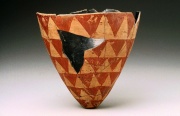Difference between revisions of "Loss"
Jump to navigation
Jump to search
| Line 1: | Line 1: | ||
| − | [[File:Drawstring bag 431077.jpg|thumb|<br>MFA# 43.1077]] | + | [[File:Drawstring bag 431077.jpg|thumb|Drawstring bag<br>MFA# 43.1077]] |
| − | [[File:19.1548-239-2_RL .jpg|thumb| <br>MFA# | + | [[File:19.1548-239-2_RL .jpg|thumb|Nubian bowl<br>MFA# 19.1548]] |
==Description== | ==Description== | ||
In a material or work of art, a loss defined as the absence of a component. Loss may occur through chemical or mechanical actions. The primary chemical action resulting in loss is corrosion. Mechanical forces may be divided into: erosion, abrasion, and wear. | In a material or work of art, a loss defined as the absence of a component. Loss may occur through chemical or mechanical actions. The primary chemical action resulting in loss is corrosion. Mechanical forces may be divided into: erosion, abrasion, and wear. | ||
Latest revision as of 09:59, 23 September 2022
Description
In a material or work of art, a loss defined as the absence of a component. Loss may occur through chemical or mechanical actions. The primary chemical action resulting in loss is corrosion. Mechanical forces may be divided into: erosion, abrasion, and wear.
- Erosion involves impingement (impact) of solid or liquid particles in a fluid (e.g., liquid) onto a surface
- Abrasion involves interaction between the surface and hard solid particles normally in one direction
- Wear involves relative motion (rubbing) between the surface and another solid substance in more than one direction
When there is a combination of degradation actions, such as corrosion and abrasion, combined effect may be more severe than sum of all individual effects.

